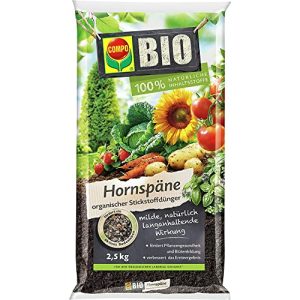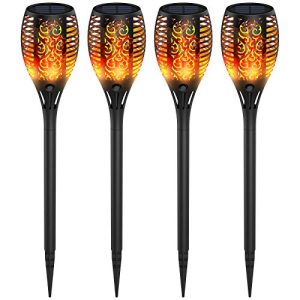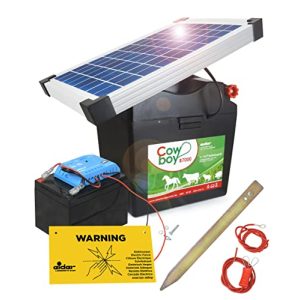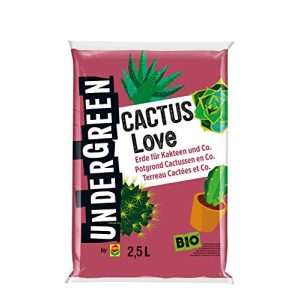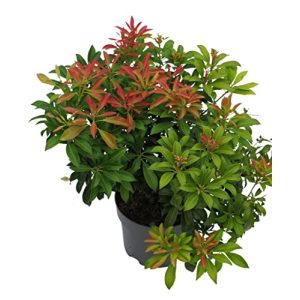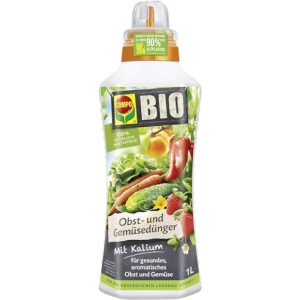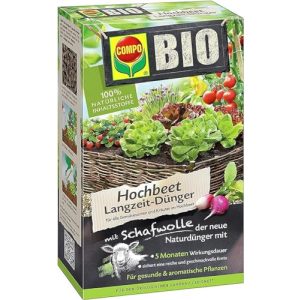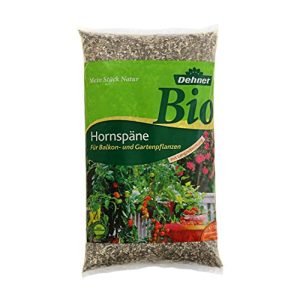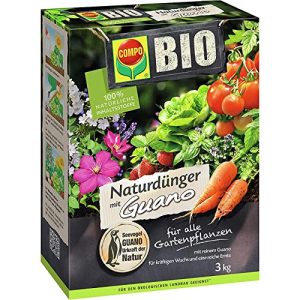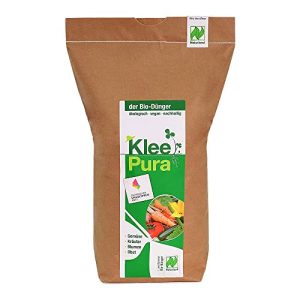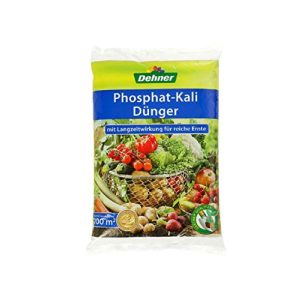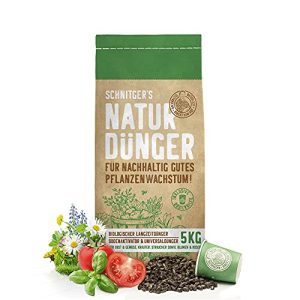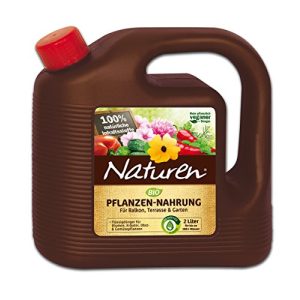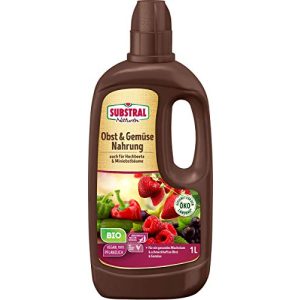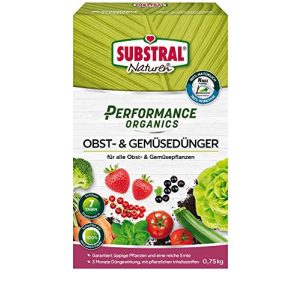Find your ideal vegetable fertilizer with our test & comparison
Test winners and price-performance highlights: Everything you need to know about vegetable fertilizer
- Vegetable fertilizers are essential helpers in the garden that promote the growth and productivity of vegetable plants. They provide nutrients such as nitrogen, phosphorus and potassium, which are essential for healthy development.
- Other benefits of vegetable fertilizer include increasing soil fertility and strengthening plant resistance to pests and diseases. Proper fertilization also improves yield and ensures tastier, nutrient-rich vegetables.
- The importance of vegetable fertilizers on the garden market cannot be denied: they are essential for successful vegetable cultivation and help hobby and professional gardeners perfect their green thumb.

The best vegetable fertilizers in the test & comparison – buying advice for a green thumb
The hunt for the greenest thumb is on! Anyone who enjoys gorgeous, healthy vegetables from their own Garden If you want to harvest, you can't avoid the topic of vegetable fertilizer. At the Buy vegetable fertilizer However, gardeners are often faced with an oversupply that is dominated by promises and pretty packaging. But what criteria actually make that happen? best vegetable fertilizer out of? My personal experiences paired with comprehensive ones Vegetable fertilizer tests and objective Compare vegetable fertilizer reveal what lies behind the label. In this Buying advice for vegetable fertilizer I separate marketing phrases from reality and show you what's important to achieve yours plants to truly blossom.
Purchase overview: Your guide to vegetable fertilizer
- The effectiveness of a vegetable fertilizer is determined by its composition and the needs of specific vegetables.
- A good vegetable fertilizer is characterized by a balanced nutrient ratio and a sustained release of these nutrients.
- The choice between organic and inorganic fertilizers should also be made from an ecological perspective.
- Special fertilizers for specific plants like tomatoes can make a significant difference in growth and crop yield.
- Price comparisons help you find a vegetable fertilizer that is both effective and economically viable.
- The correct application and Dosage of vegetable fertilizer are crucial to success in horticulture.
- Homemade fertilizer recipes offer an individual and environmentally friendly alternative to purchased products.
Amazon: Vegetable fertilizer - For a rich harvest and healthy growth of your own vegetables
- 10 kg bag
- With long-term effects for a rich harvest
- PK(Mg,S) fertilizer with partially digested rock phosphate 10+15(+5+12)
Introduction: The importance of vegetable fertilizer for a productive garden
As an avid gardener, I always emphasize the importance of Best vegetable fertilizer for the gardento ensure the nutrition of the soil and thus the growth of healthy plants to promote. The right combination of nitrogen, phosphate and potassium is essential for success in growing vegetables and therefore for rich ones Vegetable harvesting. This article will share my experiences and insights regarding both conventional and natural vegetable fertilizer shared that contribute to a lush and healthy garden.
In particular, I look at the effects of different types of fertilizer on a wide variety of vegetables and highlight which components are crucial for strong plant growth. Essential for anyone who wants to improve the quality of their soil and maximize the yield of their garden is knowledge about how to use essential nutrients most effectively.
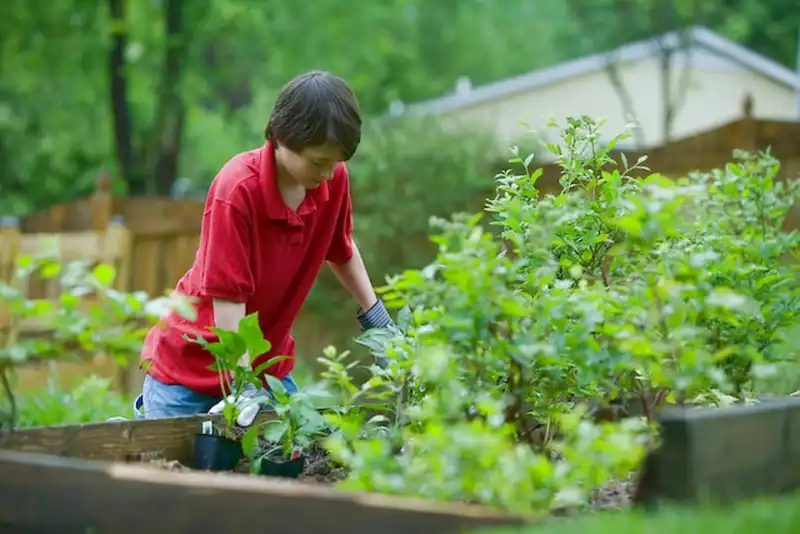
It often contains a balanced amount of macronutrients such as nitrogen, phosphorus and potassium, as well as key trace elements that are important for the growth, development and production of vegetables.
You can find them in my detailed test Best vegetable fertilizer for the garden special attention, and I discuss why targeted fertilization is the be-all and end-all for first-class Vegetable harvesting at a hunt.
- Insight into the need for a balanced nutrient intake
- Comparison between conventional and natural fertilization methods
- Practical tips on using and selecting the optimal vegetable fertilizer
In-depth consideration of different fertilizer brands and types provides deep insights and enables both the hobby gardener and the professional farmer to make an informed decision when purchasing fertilizer and thus contribute to a successful vegetable harvest.
Vegetable fertilizer in direct comparison: liquid fertilizer or granules?
As a passionate gardener, I have learned the efficiency and application of Liquid vegetable fertilizer and Vegetable fertilizer granules always in view. Choosing between these two types of fertilizer can definitely determine the yield and health of your vegetable garden. Below I would like to show you the following using genuine branded products Advantages of liquid fertilizer as well as the Effectiveness of granular fertilizer illuminate and thus help you make an informed decision.
Advantages and disadvantages of liquid fertilizers
The use of liquid vegetable fertilizers such as Compo ORGANIC fruit and vegetable fertilizer is very simple and enables rapid nutrient absorption. These products provide plants with immediately available nutrition and are ideal for use during critical growth phases. Handling is convenient thanks to the dosing aids provided, which largely prevents excessive or insufficient supply. Another plus point is its versatility, from small pots to extensive raised beds. However, it must be noted that liquid fertilizers must be applied more frequently, which leads to a more intensive connection to watering behavior.
Application and effectiveness of granular fertilizers
The Effectiveness of granular fertilizer, for example the brand LanDixx with its blue fertilizer universal, manifests itself primarily in a long-lasting release of nutrients. This supports continuous growth and leads to increased plant resilience. The solid form of these fertilizers allows the necessary amount exactly to dose and thus ensure long-term, sustainable supply. In addition, storing granules is much less problematic. However, it should be borne in mind that the nutrients are released to the plants more slowly, which makes the adjustment to the specific needs of certain vegetable plants somewhat more complex.
My direct comparison shows that both Liquid vegetable fertilizer as well as most Vegetable fertilizer granules have their specific advantages. Both forms of fertilizer may be recommended depending on the situation and individual requirements of your vegetable garden. Ultimately, it is the combination of correct application and knowledge of the specific properties and needs of the vegetable that determines the success of your gardening.
Amazon vegetable fertilizer: The natural power for tasty and vitamin-rich vegetable plants
- DOSAGE NOTE: 5 kg KleePura organic fertilizer is sufficient for up to 50 m² area. The recommended...
- EVERYTHING GROWS WELL: Organic plant fertilizer suitable as vegetable fertilizer, fruit fertilizer, flower fertilizer,...
- NATURLAND CERTIFIED: The first and only organic fertilizer that complies with the guidelines of the ecological...
Organic vs. Inorganic Vegetable Fertilizers: An Ecological Perspective
As a passionate gardener, I look at choosing the right vegetable fertilizer not only from the perspective of plant health, but also from the perspective of its ecological impact. Organic vegetable fertilizer, which is made from natural materials such as the Plantura organic universal fertilizer or the guano fertilizer from Compo, supports the organic farming and contributes to improving soil quality.
- Promotes soil structure
- Improves the living conditions of microorganisms
- Releases nutrients gently and sustainably
Bid against it inorganic vegetable fertilizers a quick and efficient supply of nutrients, which can rapidly increase plant growth. But this type of fertilizer product also poses risks:
- Short-term over-fertilization of the soil
- Disruption of ecological balance and soil health
- Potential impairment of water quality due to leaching
As an advocate of organic farming My focus is on fertilization that combines sustainability and environmental compatibility. The choice of fertilizer is therefore a balance between the long-term benefits for the ecosystem and the short-term need for optimal growth of the vegetable plants. After comprehensive analysis, I always find that... organic vegetable fertilizer is the key to a healthy garden and responsible garden culture.
Nutrient requirements of different vegetables
Every hobby gardener knows how important correct fertilization is for the growth and quality of vegetables. In order to optimally support them, it is essential to understand the specific nutrient requirements of the individual varieties. Anyone who is interested in vegetable fertilizer for tomatoes needs to know that they are particularly potassium-loving. But also the demands of plants Raised beds and on the balcony must not be neglected. Let's take a look at the ideal characteristics of fertilizer for these specific vegetable needs.
Special vegetable fertilizer for tomatoes and its properties
As already mentioned, need Tomatoes a fertilizer, which is rich in potassium to ensure abundant fruiting and good taste. It is also an advantage if the fertilizer is additional Calcium and magnesium, because these nutrients are crucial for plant health. Exemplary products such as the Florissa Natural 58842 or the Substral Natures vegetable fertilizers effectively support the growth and taste of tomatoes. They provide a special blend of nutrients specifically designed to meet the needs of this popular fruit.
The right fertilizer choice for raised beds and balcony gardens
Unlike tomatoes, which often find their place in garden beds, vegetables need in Raised beds and on the balcony often a different form of fertilization because the root space is more limited. It is best to use liquid fertilizers, which offer a high concentration of important nutrients but can still be used in smaller quantities. Organic Fertilizersoptions are ideal for these growing conditions as they protect the soil structure and prevent over-fertilization. In doing so, you contribute to the health of your plants and the quality of your harvest, whether on the balcony railing or in the garden raised bed right on your doorstep.
Get your vegetable fertilizer on Amazon now and pamper your plants with the best nutrients
- High-quality organic fertilizer with 30% natural guano, supplying garden plants of all kinds as well as...
- Natural growth power in its purest form: Seabird guano as a valuable, natural...
- Easy to use: Even application of the fertilizer on the ground, surface...
Buying vegetable fertilizer: What should you pay attention to?
When purchasing Cheap vegetable fertilizer Investing is important, but we must not forget that the Ingredients of vegetable fertilizer crucial for one healthy vegetable harvest are. A conscious selection not only supports growth in your own garden, but also contributes to organic farming. This article highlights what aspects are important when purchasing vegetable fertilizer to protect both plant health and the environment.
Analyzing the ingredients for a healthy vegetable harvest
The Ingredients of vegetable fertilizer are the be-all and end-all of a nutrient-rich and tasty harvest. Nitrogen, phosphate and potassium are just some of the essential nutrients that every vegetable needs. However, the correct ratio of these components is crucial because different types of vegetables have different needs. To maximize the benefits to our health and that of our plants, we should ensure that the Fertilizer preferably natural contains ingredients and is free of heavy metals and synthetic additives. Particularly for organic gardens Organic vegetable fertilizer and non-chemical is the best choice.
Tips for price comparison and quality recognition
Quality has its price, yes Cheap vegetable fertilizer Shopping doesn't mean you should compromise on nutritional value. A close look at prices in relation to fertilizer nutrient density and yield can make a significant difference to vegetable harvests. It is worth comparing both prices and reviews of liquid and granular fertilizers to get the best quality at a reasonable price. Particular attention should be paid to the Organic vegetable fertilizer are compatible to ensure sustainable and responsible gardening.
Best application time and dosage of vegetable fertilizer
As a passionate gardener, I know that... Application of organic vegetable fertilizer is one of the key practices for successful plant growth. Through my experiences I would like to emphasize how crucial it is to have the right times and the appropriate ones Dosage of vegetable fertilizer to know. Let's take a look together at when and how vegetable fertilizer is used optimally.
- Spring: The first fertilization is due at the beginning of the growth phase. This creates a basic supply of nutrients for the development of the plants.
- Flowering time: During the transition to flowering, plants need additional nutrients for fruit production.
It is important to note: The Dosage of vegetable fertilizer should always be carried out in accordance with the manufacturer's instructions. Too high a dosage risks damaging the plants due to salt accumulation in the ground to harm. On the other hand, too little fertilizer can lead to nutrient deficiencies, which ultimately affects the quality and quantity of the crop.
Among my favorites at the Application of organic vegetable fertilizer what counts is careful observation of plant reactions. Do the leaves appear healthy and strong? What about fruit development? These are important indicators for effectively controlling fertilization.
Organic vegetable fertilizer and vegan fertilizer: Sustainable options for the hobby garden
As a passionate gardener, I am always looking for products that are beneficial not only to my plants, but also to our mother Earth benefit. In this context we are talking about Organic vegetable fertilizer and vegan vegetable fertilizer – two sustainable alternatives that have already achieved excellent results in my own garden. The Use of organic fertilizers and vegan options is no longer just a small niche, but a movement for environmentally conscious farming.
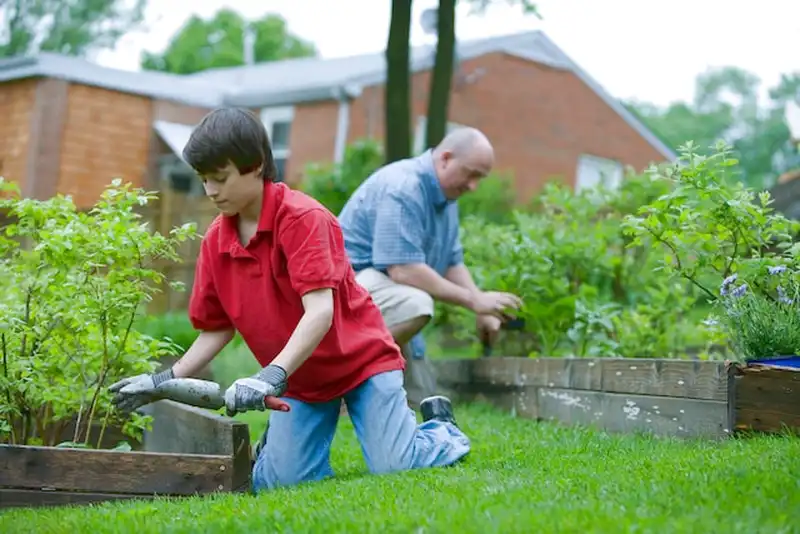
Vegetable fertilizer can be available in different forms such as liquid, granular or pellet form and can be applied depending on the need and type of plant.
Benefits of organic vegetable fertilizers and their use
Using Organic vegetable fertilizerlike that Plantura Organic universal fertilizer or Cuxin DCM vegetable fertilizer lays the foundation for sustainable vegetable cultivation. By revitalizing the soil and promoting vibrant microorganism life, my vegetables develop their full growth potential. Compost and other natural fertilizers also play a big role; They improve the structure of the soil and ensure fertile conditions Long term have a positive impact on the ecosystem of my garden.
Consideration of vegan fertilizer options and their environmental impact
Vegan vegetable fertilizer is an innovation that particularly excites me. The conscious decision to avoid animal ingredients - as is the case with some products from seramis is the case - means that I use a fertilizer that combines ethical and ecological values. Environmentally friendly fertilizer options are not only good for my plants, but also reflect my respect for all living things and protect natural Resources.
Amazon Vegetable Fertilizer: Specially developed to meet the needs of vegetable plants - for strong stems and juicy fruits
- 100 percent horn, natural nitrogen fertilizer
- 14 percent organically bound nitrogen
- Strengthens the resistance of your plants
Homemade vegetable fertilizer: Homemade recipes
As a garden lover, I attach great importance to organic cultivation and have therefore been looking for ways to Homemade vegetable fertilizer easy and inexpensive to make yourself. I'm on numerous counts native vegetable fertilizer recipes that offer an ideal alternative to commercial products. Here I share my knowledge and experience with you on how to create one Vegetable fertilizer without chemicals to maintain your garden in an environmentally friendly and sustainable way.
Natural vegetable fertilizer recipe for home cultivation
A proven natural fertilizer can be made from kitchen waste such as coffee grounds, eggshells and banana peels. These contain important nutrients such as nitrogen, calcium and potassium, which are necessary for the growth of your plants.
- Crush eggshells in one mortar and sprinkle them directly into the soil around the plants.
- Drying Solutions Take banana peels and chop them up before adding them to the compost.
- Mix coffee grounds into the soil to supplement nitrogen and loosen the soil.
These methods are not only simple but also extremely effective when it comes to: Ecological fertilizer DIY to set up yourself.
Instructions for making organic vegetable fertilizer
Making your own compost is probably one of the best methods for producing organic fertilizer. For effective compost that will enrich your garden, consider the following:
- Collect kitchen waste such as vegetable scraps and coffee grounds, as well as garden waste such as grass clippings and leaves.
- Layer green (nitrogen-rich) and brown (carbon-rich) materials alternately in your composting unit or a compost pile.
- Be sure to turn over regularly to ensure good ventilation and decomposition of materials.
- With enough patience and care, this mixture will turn into a nutrient-rich one organic fertilizer transform that you can use throughout the garden.
With one you made yourself We exclude organic fertilizer from natural fertilizer circulation and promote healthy plant growth without having to resort to chemicals.
Everything you need to know about vegetable fertilizer
Vegetable fertilizer is an important part of farming and gardening. It is a substance added to the soil to help vegetable plants grow and improve their health.
What is vegetable fertilizer?
Vegetable fertilizer is a substance specially made to support the growth of vegetable plants. It contains a blend of nutrients that plants need to grow and stay healthy. Typical nutrients in vegetable fertilizer are nitrogen, phosphorus and potassium.
Who Uses Vegetable Fertilizer?
Vegetable fertilizer is used by farmers and gardeners around the world to promote the growth and health of vegetable crops. It is particularly important in organic farming as these crops are grown naturally without the use of synthetic pesticides and fertilizers.
How is vegetable fertilizer made?
Vegetable fertilizer is made from a variety of natural and synthetic materials, including animal manure, compost, bone meal, and synthetic minerals. The exact composition depends on the type of vegetable fertilizer being made.
Where does vegetable fertilizer come from?
In the 19th century, the first mineral fertilizer was developed by combining nitrogen, phosphorus and potassium Natural sources such as guano or bone meal became. Over time, different types of fertilizers have been developed to meet the different needs of plants.
Nowadays there is a wide range of vegetable fertilizers on the market that are from organic or mineral Sources come from. Some vegetable fertilizers are also produced synthetically to allow for more precise control over nutrient composition.
When should vegetable fertilizer be used?
Vegetable fertilizer should typically be used before planting or while the vegetable plants are growing. The exact time depends on the type of Fertilizer and the type of plants .
What is vegetable fertilizer for?
Vegetable fertilizer is used to promote the growth of vegetable plants and improve their health. It helps plants absorb nutrients and be more resistant to diseases and pests.
Types of vegetable fertilizer and their features
Synthetic Fertilizers
- Are made from chemical compounds
- Fast-acting but short-lived
- Can lead to soil acidification
Organic Fertilizers
- Made from natural sources such as animal manure, compost and bone meal
- Slow acting but long lasting effect
- Gentler on the soil and more environmentally friendly
liquid fertilizers
- Are dissolved in water and can be applied directly to the plants
- Acting fast, but short-lived
- Can be expensive
Fertilizer sticks
- Are stuck directly into the ground and slowly release their nutrients
- Slow acting but long lasting effect
- Good for potted plants
Vegetable fertilizer advantages / disadvantages
Benefits
- Promotes the growth of plants and improves their health
- Can increase crop yields
- Can make plants more resistant to diseases and pests
Disadvantages
- Over-fertilization can lead to environmental pollution
- Can be expensive
- Not all fertilizers are suitable for all types of vegetables
| type of fertilizer | characteristics |
| Synthetic Fertilizers | Chemical, fast-acting, short-lived, may cause soil acidification |
| Organic Fertilizers | Natural, slow-acting, long-lasting, gentler on the soil and more environmentally friendly |
| liquid fertilizers | Soluble in water, fast-acting, short-lived, expensive |
| Fertilizer sticks | Slow-acting, long-acting, good for potted plants |
Which vegetable fertilizer should I use for my balcony plants?
A liquid vegetable fertilizer is suitable for balcony plants because it is easy to dose and quick is absorbed by the plants. A long-acting vegetable fertilizer is also a good option as it releases nutrients over a longer period of time, supporting plant growth. Organic fertilizers made from compost are also suitable for balcony plants because they are gentler on the soil Growth of plants naturally promote way.
Which vegetable fertilizer should I use for my raised bed?
A vegetable fertilizer with a long-term effect is suitable for raised beds, as it releases nutrients over a longer period of time and thus supports the growth of the plants. Also organic fertilizers Composts are for raised beds suitable because they are gentler on the soil and promote the growth of plants in a natural way. A good alternative is also a liquid vegetable fertilizer quickly from the plants is recorded.
What fertilizer should I use for eggplants?
Eggplants need a fertilizer rich in nitrogen and potassium, as these nutrients are important for plant growth and development. A slow-release vegetable fertilizer is a good option as it will release nutrients over a longer period of time, helping plants grow. Organic fertilizers from compost are also suitable for eggplants, as they are gentler on the soil and naturally promote plant growth.
What is slow release vegetable fertilizer and how does it work?
Long-acting vegetable fertilizer releases nutrients over a longer period of time so that the plants continuously receive the nutrients they need nutrients supplied become. The fertilizer consists of small grains that are incorporated into the soil. Through the Moisture in the soil The grains slowly dissolve and release nutrients to the plants. This type of fertilizer is particularly practical because it only needs to be applied once and works over a longer period of time.
Which vegetable fertilizer should I use for organic farming?
Only organic fertilizers should be used for organic farming, as synthetic fertilizers are not compatible with the principles of organic farming. Suitable organic fertilizers include compost, manure or Horn shavings, These Fertilizers provide the plants naturally Way with nutrients and promote the growth of plants in a gentle way.
Can I make my own vegetable fertilizer from compost?
Yes, compost is ideal as a vegetable fertilizer because it absorbs nutrients delivers naturally and is gentle on the floor fertilizes. To use compost as vegetable fertilizer, you should allow it to mature long enough so that it is completely broken down and contains no harmful bacteria or weeds. The mature compost can then be worked directly into the soil or placed on top of the soil as a mulch to retain moisture in the soil and promote plant growth.
Alternatives to vegetable fertilizer
There are a few alternatives to traditional vegetable fertilizer:
1. Green manure
Cover crops are plants such as clover or alfalfa grown in the field to enrich the soil with nitrogen and help other plants grow.
2. Compost Tea
Compost tea is a liquid form of compost and contains nutrients that plants can absorb. It can be used as a fertilizer and naturally supports the growth of plants.
3. Plant manure
Plant manures are liquid fertilizers that can be made from various plants. For example, nettles or comfrey can be used to create a manure that is rich in nutrients.
How is vegetable fertilizer tested?
Vegetable fertilizer is usually tested in laboratories to determine its nutrient levels and effects. Field tests are also carried out to see how well the fertilizer works in practice. For example, the growth rate of plants is measured or the harvest yields are compared. As a rule, fertilizers are tested by independent organizations to confirm their effectiveness and safety.
Vegetable fertilizer tests in specialist magazines
Some specialist magazines regularly test vegetable fertilizers and publish their results. Examples of this are the magazine “Garten Praxis” or “Ökotest”. The tests typically include an evaluation of the nutrient composition, application and effectiveness of the fertilizer. The ratings are given on a scale of one to five stars.
Is there a test of vegetable fertilizer on Stiftung Warentest?
Yes, Stiftung Warentest has carried out several tests on fertilizers in the past, including vegetable fertilizers. The tests include an assessment of the nutrient composition, application and effectiveness of the fertilizer. Ratings are given on a scale of one to five stars.
Well-known manufacturers or brands for vegetable fertilizer
Some well-known manufacturers and brands of vegetable fertilizer are:
Best seller among vegetable fertilizers
Some of the best-selling vegetable fertilizers are:
Neudorff Bio-Trissol tomato fertilizer
Compo organic vegetables and herbal fertilizer
Substral Natures Organic vegetable fertilizer
Cuxin Organic Vegetable and herbal fertilizer
Seramis plant fertilizer for fruit and vegetables
Where can I buy vegetable fertilizer?
Vegetable fertilizer can be purchased at many nurseries, hardware stores, and garden centers. In addition, there are a large number of online shops that offer vegetable fertilizer. Some of the most famous online shops for vegetable fertilizer are:
Amazon
Obi
Trays
GardenXXL
Baldur garden
In retail stores such as Bauhaus, Hornbach, OBI, Dehner or Globus DIY & Tools You can also find a large selection of vegetable fertilizers. Some of these stores also offer consulting services to help you choose the right one Fertilizer for your plants to help.
Before you buy vegetable fertilizer, you should consider the following:
1. Plant needs
Each plant species has different nutritional needs. Find out in advance what nutrients your plants need in order to choose the right fertilizer.
2. Kind of fertilizer
There are different types of vegetable fertilizers, such as organic fertilizers, mineral fertilizers or slow-release fertilizers. Choose the fertilizer that best suits your needs.
3. Dosage
When dosing the fertilizer, be careful not to exceed the recommended amount to avoid over-fertilization and damage to the plants.
4. Safety Instructions
Read the safety instructions on the fertilizer packaging and follow them carefully to avoid injury or damage.
5. Environmental sustainability
Choose a vegetable fertilizer that is environmentally friendly and has no harmful effects on the environment.
Why it pays to buy a vegetable fertilizer
A vegetable fertilizer can support the growth and health of your plants by providing them with the nutrients they need. By using a fertilizer you can also improve the quality and taste of your harvest. In addition, by purchasing an eco-friendly fertilizer, you can also help protect the environment.
What you should definitely know about vegetable fertilizer
When using vegetable fertilizer, you should ensure that you adhere to the recommended dosage to avoid over-fertilization and damage to the plants. In addition, you should Fertilizer tailored to the needs of your plants vote and choose an environmentally friendly fertilizer. Always store the fertilizer in one place cool and dry place and keep it away from children and pets.
Conclusion
My investigation and evaluation of various fertilizer products including the Best vegetable fertilizer for raised beds as well as specific Organic vegetable fertilizer for herbs, has shown that the needs of the vegetable and the gardener largely determine the choice of fertilizer. While some plants prefer faster nutrient uptake from liquid fertilizers, others benefit from the slow and steady release that granular fertilizers provide.
The Comparison of the best vegetable fertilizers has made it clear that organic vegetable fertilizers in particular are excellent options for environmentally conscious and sustainable garden care. Due to their composition, they not only promote the abundance and quality of the harvest, but also help maintain soil quality and promote a healthy ecosystem.
Ultimately, not only the quality of the vegetable fertilizer is crucial for success in the garden, but also competent application. Adaptation to the individual nutrient needs of the plants and the right timing are essential factors that need to be taken into account. My goal through this article was to provide you with in-depth knowledge that will help you set the right course for a bountiful harvest and a thriving garden.

